
|
2011 Works in Progress |

|
Pentagon Papers: Volume III |
|
Share / Bookmark |
|
Lyndon Johnson |

|
The Johnson Years / 1964 - 1965 |
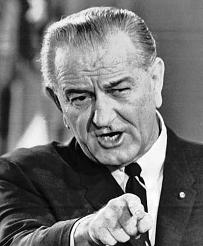
|
The new President greatly expands America’s forces to begins a ground war |
|
Volume III of the Gravel edition of the Pentagon Papers details America’s growing involvement in Vietnam from 1964 through 1965.
Our original production traces this involvement from the first year of President Lyndon Johnson’s administration through deployment of major U.S. forces. These events will be theatricalized with actors, historic images, and music.
Volume III begins in 1964 just as a second coup occurs in Saigon. U.S. officials had some advance notice, but they were left with the feeling that they did not know what was really going on in South Vietnam.
In Washington, the Administration was receiving mixed reports of the situation, but there was a clear indication that prospects for the government of South Vietnam were not good. The U.S. made a decision to embrace the coup leader, Gen. Nguyen Khanh, and to hope for the best.
Secretary of Defense Robert McNamara and Chairman of the Joint Chiefs of Staff Maxwell Taylor visited South Vietnam soon after the coup. From their fact-finding mission, they wrote a memorandum to the President on how the U.S. might best assist Saigon. This memorandum, NSAM 288, called for considerable enlargement of U.S. forces in South Vietnam…which also meant a greater commitment of U.S. prestige.
An increase in military support, however, was not sufficient to meet the overwhelming need to provide security in South Vietnam. A host of internal challenges kept the government of South Vietnam from addressing this crucial factor in the lives of its people. And as long as these internal challenges were not addressed, the security situation continued to deteriorate.
At last, Gen. Khanh effectively threw up his hands at dealing with his government’s problems and pressured the U.S. to enter the war with South Vietnam as a co-belligerent against North Vietnam. While this prospect had been in the minds of U.S. leaders, it was not what they wanted to pursue during an American Presidential election year.
For some time, the U.S. and South Vietnam had been provoking North Vietnam with commando raids and destroyer patrols off its coast. This provocation led to a response by the North in August 1964 known as the Gulf of Tonkin affair. The U.S. Congress soon after approved a resolution for Johnson to take whatever military actions he deemed necessary.
The President became increasingly focused on achieving satisfactory results in South Vietnam. Additionally, U.S. leaders in South Vietnam urged Khanh and his government to do more for themselves…all without success.
Another fact-finding mission took place resulting in yet another security memorandum, NSAM 328. This directive went far beyond the previous one, greatly increasing the U.S. mission and its military support. In February 1965, as this memorandum was being developed, the Viet Cong attacked a U.S. Marines’ airfield and barracks in Pleiku. Immediately, the U.S. began reprisal bombing against North Vietnam and landed more Marines at Danang. In the midst of this, Gen. Khanh was ousted in yet another coup.
Gen. Taylor, now serving as Ambassador to South Vietnam, was beginning to carry out the diverse programs specified in NSAM 328, while resisting efforts to involve greater U.S. combat forces. In April, however, following North Vietnam’s blunt response to President Johnson’s offer for unconditional talks, the Administration made a decision to involve increasing numbers of U.S. forces directly into struggle. America entered the fight.
Note: The Vietnam study, later known as the Pentagon Papers, was commissioned by U.S. Secretary of Defense Robert McNamara to answer a profound question: how did America come to have more than a half-million servicemen in Southeast Asia. He wanted an answer while events were still fresh in the minds of participants. The source materials were drawn primarily from the Secretary’s files. It became a 4,000-page narrative with 3,000 pages of supporting documents written by a number of analysts. One of these the analysts, Daniel Ellsberg, made copies of most of the pages. He provided one copy to Alaskan Senator Mike Gravel who entered the pages into the public record as part of his Senate Subcommittee in June, 1971. |
|
Works in Progress is a program of the Cultural Services Division of the Torrance Community Services Department. This series is presented in association with El Camino College Community Education, Torrance CitiCABLE 3, Torrance Community Television, Torrance Historical Society & Museum, Torrance Public Library, University Art Gallery CSU Dominguez Hills, Vietnam Veterans of America - Chapter 53 |

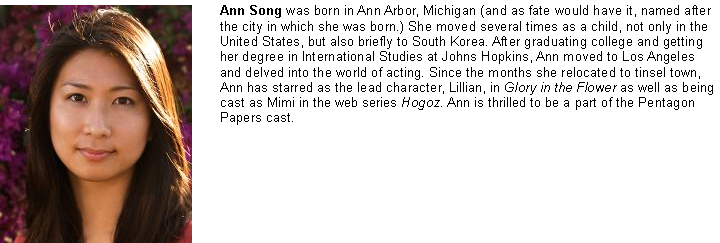
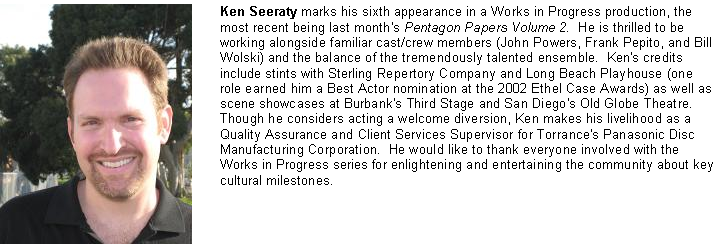

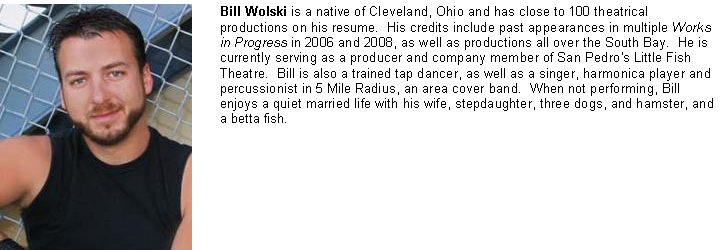
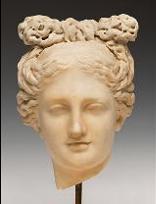
|
Joseph E. Murray is originally from Boston, and he left successful careers in helicopter rescue and organ transplant for the financial security of a life in the theatre. He holds a BA from Tufts University and an MFA in Acting from The University of Texas at Austin. His favorite regional roles include Tom in Glass Menagerie, George in All My Sons, Lenck in Bach at Leipzig, Theo in The Underpants and Lysander/Oberon in A Midsummer Night’s Dream. Film and TV credits include Detective Frank Lupo in the indy feature Happy Ever After, Law and Order SVU, Rescue Me, The Closer, Guiding Light, As The World Turns, and All My Children. He loves presenting highly relevant theatrical work and is grateful for the opportunity to work on Pentagon Papers, as well as the recent Wedded. |

|
Jani Wang was born in Shanghai, China, and moved to northern California at nine months of age, where she grew up before locating to Los Angeles for college. While obtaining her Bachelor of Arts in Business and Economics with a minor in Accounting at UCLA, Jani began to explore acting. Recently, she starred in a film for the Shanghai World Expo, an international McDonalds commercial, numerous short films, and the web series Hogoz. Jani is very excited to have the opportunity to work on Pentagon Papers. |

|
Tom Brewer has lived in the City of Torrance since he was two years old and is making his stage debut in Pentagon Papers. Although he has helped behind the scenes for many years with his daughter Chelsea's stage productions, he has never been on stage himself. Tom was elected to the Torrance City Council in 2006 and re-elected in 2010. He serves on a variety of committees for the City Council. Prior to his election to the City Council, Mr. Brewer served on the City's Civil Service Commission and the Environmental Quality and Energy Conservation Commission. His contribution to the community includes involvement in the Torrance Education Foundation, Southwood Riviera Homeowners' Association and the Southern California Branch of the American Society for Microbiology. Mr. Brewer is married to Carolyn and is a Clinical Microbiologist at the UCLA Medical Center. |
|
Cast |